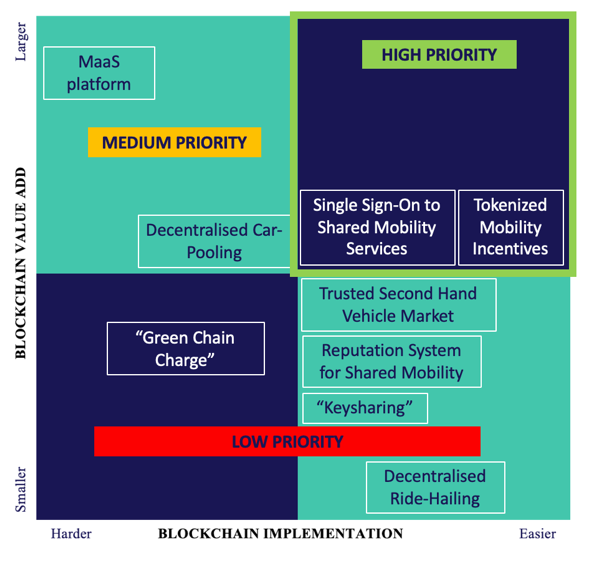Author: Josep Laborda (Factual)
Blockchain momentum in Catalonia
According to the report “Blockchain in Catalonia” published by ACCIÓ, there are at least 35 companies in the blockchain ecosystem in Catalonia, and the list has soon become outdated, as it is growing every day, significantly with stakeholders fostering disruptive innovation in the mobility sector. Stakeholders identified interact with blockchain and other DLT either by using it as the enabling technology for the development of new services, provide consultancy and strategic advice to other companies and the public sector, or work in the field of cryptocurrencies. The Government of Catalonia has developed a “Blockchain Strategy of Catalonia”, where a number of use cases have been prioritised due to their transformational potential, such as “Mobility and public transport”, including Mobility as a Service (MaaS). Moreover, Barcelona has been awarded a chapter of BECON (Blockchain Ecosystem Network), one of the most influent global organizations pioneering the deployment of blockchain which has only one chapter per country, and is the host city of the “Blockchain Solutions World” – part of the IoT Solutions World Congress – which focus on solutions and real-world use cases on different vertical sectors, such as “Connected Transport & Logistics” (as a side initiative, the “Barcelona Blockchain Week” hosts a series of activities during the week the fair is held, including informative sessions and thematic lectures). The “European Blockchain Convention” has consolidated as a leading event in the blockchain world, and is promoted from Barcelona, where the first editions have been held. Last but not least, Barcelona is the European capital of urban mobility thanks to the recently awarded EIT’s KIC on Urban Mobility, where CARNET has been a key partner, together with the City of Barcelona. For all of the above, CARNET believes there is clearly momentum and a huge potential for disruption in the field of mobility underpinned by blockchain technology, and so has liaised with FACTUAL, a foresight boutique innovation consultancy focused on mobility, to develop a project aimed at understanding how blockchain and other DLT can be applied in the mobility sector.
Challenge & Objectives
Being clearly a nascent (yet promising) technology, and on its way to mature products and services, various challenges concerning technical, economical, and legal & regulatory issues are still to be overcome by blockchain. Accordingly, the project has been articulated to cover the following high level objectives:
- Provide training and baseline on blockchain/DLT, and their potential in the mobility sector, for interested stakeholders to understand blockchain technology, starting from its basic components and characteristics, as well as how to leverage it as enabling technology to tackle urban mobility challenges and use cases. This has been achieved through the organization of a 3-day course – “Blockchain, Distributed Ledger Technologies (DLT) y Criptoeconomía: Introducción y potencial disruptivo en movilidad” – held at the Polytechnic University of Catalonia (UPC).
- Identify, rank and prioritise blockchain-underpinned use cases for urban mobility: this has been addressed through the organization of a first interactive workshop, where stakeholders from the local mobility sector, public and private – including ATM, AMB, UPC, Seat, Rücker Lypsa, Saba, Pildo Labs, Finboot – gathered and discussed 10 previously drafted use cases. The session was moderated by CARNET and FACTUAL, with expert insights from Pompeu Fabra University, the UPC, and Finboot. Use cases were analysed, discussed and judged against two dimensions (axes): the added value brought in by using blockchain, and the technical complexity / matureness / State of the Art of required blockchain components towards a future Proof-of-Concept implementation. Following is a figure that summarizes the result of the analysis, and the classification of use cases:

- Drive two “winning” use cases towards Proof-of-Concept (this will be done in a later stage by e.g. participating in an EC-funded project). Following is a description of the two prioritised use cases, which have been further analysed in two separate workshops:
1) “Multi-Operator Single Sign-On to Shared Mobility Services”: currently, Mobility Service Providers (MSP) go to market essentially by deploying a fleet of vehicles, developing a user-facing app that lets users sign up to their service, and once validation of users are completed, let them book and pay for rides. One of the many challenges all MSP’s face is the need to grow their user base in order to stay profitable at some point, and this inevitably means spending huge amounts of cash into marketing campaigns and other user acquisition strategies. Whichever way one looks at it, becoming a new customer of a shared mobility service is a tedious process from the user perspective. Despite UX/UI designers and developers generally do a good job into making this Sign-On process (to become a new customer) as fast and sleek as possible, users are asked to upload a picture of their valid driver’s license, take a selfie and input a credit card number, plus other personal data… For each and every mobility service they want to sign-up to! What if this Sign-Up process was decentralized to a specialist company leveraging a biometric and document reading & validation software? What if several MSP’s would then agree on a collaborative user onboarding process? Imagine a “validator” on the blockchain receives information from users willing to Sign-On to a Mobility-as-a-Service scheme: once this validator has confirmed the user holds a valid driver’s license and credit card he/she can be seamlessly signed up to all MSP’s included in the MaaS scheme that trust this “validator”… At once! This would truly be a killer feature boosting user adoption of new mobility services. Immediate positive effect would be that MSP’s could onboard more users, unlock economies of scale, multiply network effects and ultimately dramatically reduce user acquisition costs, redistributing value generation in a more efficient way.
2) “Tokenized Mobility Incentives”: a unified token, wallet and marketplace for earning and spending mobility related rewards. End users would earn tokens for sharing their mobility data or making small but important changes to their travel behaviour (such as, e.g. redistributing light shared vehicles, such as bikes or kick-scooters, where demand is, or recharging at home). Earned tokens would then be spent on mobility related products or services within an ecosystem of selected partners. Users would maintain control over the data they choose to share (and get rewarded for) with real-time access controls. On the other hand, MSPs (both public and private) would be able to share operational data e.g. user demand for their services. The scheme could pivot to underpin “loyalty programmes”, allowing businesses, universities, retailers and restaurants to subsidize transportation for customers and employees and help drive retail traffic to brick-and-mortar stores by offering ride subsidies to users of shared mobility services.
Clearly, blockchain technology offers countless opportunities in the mobility sector. However, the translation into real business value will be driven by industry adoption and will evolve over time. This is why development of use cases, Proof of Concepts and pilots are the way forward.
Please contact us to further discuss at: info@factual-consulting.com




